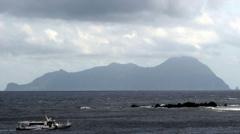For centuries, the Miwatari on Lake Suwa has symbolized a divine presence during winter. However, its recent absence warns of unbalance in nature, reflecting the growing impact of climate change on cultural practices.**
The Vanishing Miwatari: A Warning from Japan’s Frosty Past**

The Vanishing Miwatari: A Warning from Japan’s Frosty Past**
In central Japan, the mystical phenomenon of Miwatari's disappearance is raising concerns among locals as they grapple with climate change and its implications on ancient traditions.**
In the serene mountains of central Japan, the landscape of winter has shifted dramatically. For over 600 years, the residents of the region have celebrated a natural wonder known as Miwatari, an ice formation that once embodied the visits of a revered Shinto god. Traditionally, a chilling rumble would echo through the night, signaling the lake's transformation into a frosted surface embellished with jagged ice ridges resembling the spine of a mythical dragon.
The arrival of the Miwatari served as both a spectacle and a spiritual reminder, inviting locals to pay homage to the deities they believed graced them with their presence. However, the recent winters have cast a shadow of uncertainty. The ice formations, which have historically appeared almost ritualistically, have not materialized in recent years. This absence is seen by locals as a dire warning, reflecting an imbalance in their natural surroundings.
Kiyoshi Miyasaka, a Shinto priest who has dedicated decades to observing Lake Suwa, recalls the last time the Miwatari graced the lake in 2018. He and fellow parishioners from the Yatsurugi Shrine ventured onto the ice to perform ceremonies, but the landscape that once offered comfort now speaks of a pressing concern.
The Miwatari's significance goes beyond folklore; it is meticulously documented. Since 1443, locals have kept detailed records of the formation's appearances, the lake's condition, and accompanying historical events, creating an invaluable archive of cold-weather patterns and community beliefs.
The decline of this phenomenon echoes the growing concerns surrounding climate change and its tangible effects on both the environment and cultural heritage. For the residents of Suwa, the Miwatari is not just an ancient tale but a reminder of the delicate dance between humanity and the shifting climate—a call to honor not only their ancestry but also the planet that sustains them. As they face a winter without ice, the community unites, reflecting on what the absence of their sacred god truly signifies.
The arrival of the Miwatari served as both a spectacle and a spiritual reminder, inviting locals to pay homage to the deities they believed graced them with their presence. However, the recent winters have cast a shadow of uncertainty. The ice formations, which have historically appeared almost ritualistically, have not materialized in recent years. This absence is seen by locals as a dire warning, reflecting an imbalance in their natural surroundings.
Kiyoshi Miyasaka, a Shinto priest who has dedicated decades to observing Lake Suwa, recalls the last time the Miwatari graced the lake in 2018. He and fellow parishioners from the Yatsurugi Shrine ventured onto the ice to perform ceremonies, but the landscape that once offered comfort now speaks of a pressing concern.
The Miwatari's significance goes beyond folklore; it is meticulously documented. Since 1443, locals have kept detailed records of the formation's appearances, the lake's condition, and accompanying historical events, creating an invaluable archive of cold-weather patterns and community beliefs.
The decline of this phenomenon echoes the growing concerns surrounding climate change and its tangible effects on both the environment and cultural heritage. For the residents of Suwa, the Miwatari is not just an ancient tale but a reminder of the delicate dance between humanity and the shifting climate—a call to honor not only their ancestry but also the planet that sustains them. As they face a winter without ice, the community unites, reflecting on what the absence of their sacred god truly signifies.



















